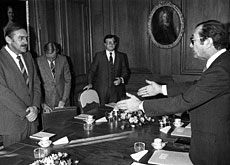
Secret service criticised for “shadow diplomacy”

Switzerland’s secret service has been condemned for pursuing “shadow diplomacy” in its dealings with apartheid-era South Africa.
But a parliamentary committee cleared the authorities of involvement in the former South African regime’s chemical weapons programme.
The committee’s report – released on Tuesday – criticised successive Swiss governments from the 1970s through to the 1990s for failing to heed warnings that the country’s intelligence service was pursuing a strategy with its South African counterpart that ran counter to official policy in Bern.
The Swiss government also came under fire for allowing the secret service “to operate freely” and for granting it a “life of its own”.
Committee chairman Alexander Tschäppät said the governments of the time should have taken responsibility for the conduct of the secret service.
“We think the politicians did not control the secret services and… this was a big mistake by the Swiss government,” he told swissinfo.
“We think some of the ministers knew what happened, but did not react to it.”
Separate probe
The report comes eight months after a separate probe commissioned by the Swiss defence ministry cleared the intelligence service – and its former chief, Peter Regli – of illegal dealings, but criticised the closeness of relations with the apartheid regime.
The latest inquiry also exonerated Regli, but criticised his close relationship with Jürg Jacomet, the former Swiss secret service agent who was in contact with the then head of South Africa’s chemical and biological weapons programme, Wouter Basson.
Regli said he welcomed the report’s findings, saying the committee had “finally cleared his name” and “rehabilitated the reputation of the Swiss secret service”.
Learning from mistakes
Tschäppät believes that the Swiss authorities have learnt from their mistakes.
“We have changed the law and now have clear rules that if the secret service in Switzerland has contacts with other countries, their first task is to inform the ministers responsible,” he said.
But the committee also made it clear that those in charge of putting together the report did not have access to as many documents as they would have liked.
“Today is the end of the story as far as we know… and we think we had everything here in Switzerland to get the right information,” said Tschäppät.
“But what we don’t have is information about what was in documents that disappeared – or were destroyed – and we don’t know what is in documents stored in South Africa.”
swissinfo with agencies
A parliamentary committee has criticised Switzerland’s secret service for pursuing “shadow diplomacy” in its dealings with apartheid-era South Africa.
In a report published on Tuesday, the committee blamed successive Swiss governments for not exercising more political control over the secret service.
The report comes eight months after a separate investigation by the defence ministry into Swiss intelligence service activities in South Africa from the 1970s to 1990s.

In compliance with the JTI standards
More: SWI swissinfo.ch certified by the Journalism Trust Initiative



























You can find an overview of ongoing debates with our journalists here . Please join us!
If you want to start a conversation about a topic raised in this article or want to report factual errors, email us at english@swissinfo.ch.